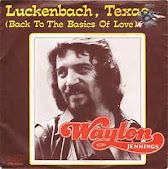The USPTO refused to register the proposed mark LUCKENBACH for whiskey, vodka, rum, and gin, on the ground that the mark is primarily merely a surname under Section 2(e)(4). On this appeal, applicant argued that LUCKENBACH has a non-surname meaning because consumers recognize it as applicant's trademark. You've probably heard of Luckenbach in a musical context. How do you thing this came out? In re Luckenbach Texas, Inc., Serial Nos. 87800638 and 87983963 (February 22, 2022) [not precedential] (Opinion by Judge Albert Zervas).

Applicant owns a registration for the mark LUCKENBACH for its entertainment venue, located near the town of Fredericksburg, Texas. Nearby Luckenbach is a scenic community in southeastern Gillespie County with strong musical associations. The site was settled in the later 1840s and early 1850s by German farmers, among them the brothers Jacob Luckenbach and August Luckenbach. It "achieved legendary proportions in 1977 . . . when the Waylon Jennings hit song 'Luckenbach, Texas (Back to the Basics of Love)' became a national favorite."
The Board agreed with the examining attorney that "Luckenbach is a rare surname" There was no evidence from newspapers or publications that showed use of LUCKENBACH as a surname such as to suggest public exposure to the term as a surname. The examining attorney submitted negative dictionary evidence purporting to support his contention that "luckenbach" is not an English language term. On the other hand, the USPTO failed to establish that any member of the Luckenbach family has ever had an interest in applicant.
Applicant submitted several declarations from Texas customers for its entertainment venue services, supposedly showing that the primary significance of "Luckenbach" is "in reference to Applicant's business" and not as a surname. The Board was unmoved:
These statements and similar statements made by other declarants are helpful in establishing acquired distinctiveness but have little bearing on whether LUCKENBACH is primarily merely a surname. Any trademark, even a trademark which is asserted as being primarily merely a surname, has an association with a business, once distinctiveness has been shown. *** Applicant's relevant evidence . . . is not "objective countervailing evidence" of a perception that "the public would perceive a proposed mark as a coinage." The declarations Applicant submitted are from Texans only, with most declarants saying that they live in or near Fredericksburg, Texas, very near Applicant's venue.
Turning to the other evidence of record, the Board found that "Luckenbach" has a non-surname meaning due to the prominence of the Waylon Jennings song. In addition, applicant submitted evidence that "luckenbach" has a meaning in German ("gap creek"). The Board has held that "whether a term is primarily merely a surname must take into consideration the meaning the term has in a foreign language." [If most Americans do not speak German, why does the German meaning matter? - ed.].
[W]e find that the mark has one or more recognized meanings other than as a surname because it comprises a key word in the title of a famous Waylon Jennings song and German-speaking U.S. consumers would recognize it as "gap creek."
Finally, the Board rejected the examining attorney's contention that "Luckenbach" has the structure and pronunciation of a surname. "The evidence that certain people had the surnames Dieffenbach, Katzenbach, Hollenbach or Bach does not persuade us that any sizeable portion of the purchasing public in the United States are familiar with the surnames."
Balancing the relevant factors, the Board found that "consumers do not commonly encounter LUCKENBACH as a surname, it has alternative meanings, and the Examining Attorney has not established that it has the structure and pronunciation of a surname." Resolving any doubts in favor of applicant, the Board concluded that LUCKENBACH is not primarily merely a surname.
Read comments and post your comment here.
TTABlogger comment: FWIW, I don't think much of that Waylon Jennings song.
The content of this article is intended to provide a general guide to the subject matter. Specialist advice should be sought about your specific circumstances.

